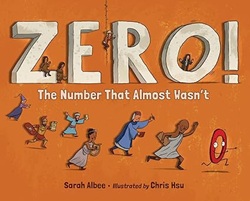
 Zero
ZeroThe Number That Almost Wasn't
Review posted October 28, 2025.
Charlesbridge, 2025. 40 pages.
Review written July 11, 2025, from a library book.
Starred Review
Fun fact: When Europeans set up the calendar we use today, they did not include a Year Zero. The year after 1 BC was 1 AD. Of course, they were given these names long, long after they happened. But because Europeans didn't understand zero when they developed the calendar - the Twenty-first Century didn't actually start until the year 2001. I tried to wrote a short article about this and tried to sell it to children's magazines in 1999 and 2000, with no success. And I have to admit that switching from 1999 to 2000 feels much more momentous than switching from 2000 to 2001, even if it wasn't actually the new century yet.
Anyway, all my thinking about when the century started sprang from the moment I learned that Europeans didn't adopt the symbol zero or even the concept of zero until well past the Middle Ages - and that's what this book is about.
This picture book explains the history of Zero in a way children can understand. (Yes, without touching on questions of what that means about the start of centuries.) It talks briefly about the concept of Nothing and the concept of Place Value, but it's mostly about the history of writing numbers.
We hear about the Babylonians - who did use a place value and a mark for an "empty" place. We hear about the Greeks, who were especially strong in astronomy and geometry. The Mayans developed zero earlier than anyone else - but their knowledge was lost when Spanish invaders destroyed their records. Roman numerals came along next, which was difficult for doing complex calculations. But during the Dark Ages in Europe, mathematics thrived in India, where an unknown mathematician invented a symbol for zero.
The concept of zero spread to Baghdad, the center of the Muslim Empire - and writings from Arabic mathematicians took advantage of the concept, developing the field of Algebra.
The book chronicles all this, plus how long it took Europeans to adopt the concept. Sadly, some Christians were even then opposed to an advance of knowledge:
A few Christian leaders actually banished zero. They argued that God had created everything, so something that represented nothing must be the work of the devil.
Finally, the invention of the printing press helped the Hindu-Arabic number system spread as people came to appreciate how much it facilitates doing mathematics.
All that is present in this picture book, with engaging cartoon illustrations. There are even notes at the back about historical details present in the illustrations.
Those who read this book will get a grasp on the mind-blowing fact that Zero had to be invented, and was actually invented much later than you'd think it was. You'll never take Nothing for granted again.
